"At Three in the Afternoon, We Decided: The Wedding Will Be Tonight"
Hedva Eisen shares the story of her daughter's swift wedding amidst COVID-19 restrictions: cautious and compliant, yet full of immense joy.
 The bride's chair in the synagogue
The bride's chair in the synagogueIt started with restrictions allowing 5000 people, then reduced to one hundred, then ten, then two, and only Hashem knows what comes next. At that point, almost no one realized how threatening and life-endangering the imported virus was. The anxiety was daily, and the Ministry of Health's instructions shook everyday life. Guidelines and restrictions rapidly succeeded one another — and opposite them stood hundreds of families facing upcoming celebrations, uncertain about their plans. What would be the highlight of their lives? What kind of event would they have?
Many fears, many disappointments, and countless question marks concentrated into the weeks between Purim and Passover. How did the planned events shrink? How do you organize a quick wedding with few participants? And most importantly – how do you maintain the joy despite all the difficulties?
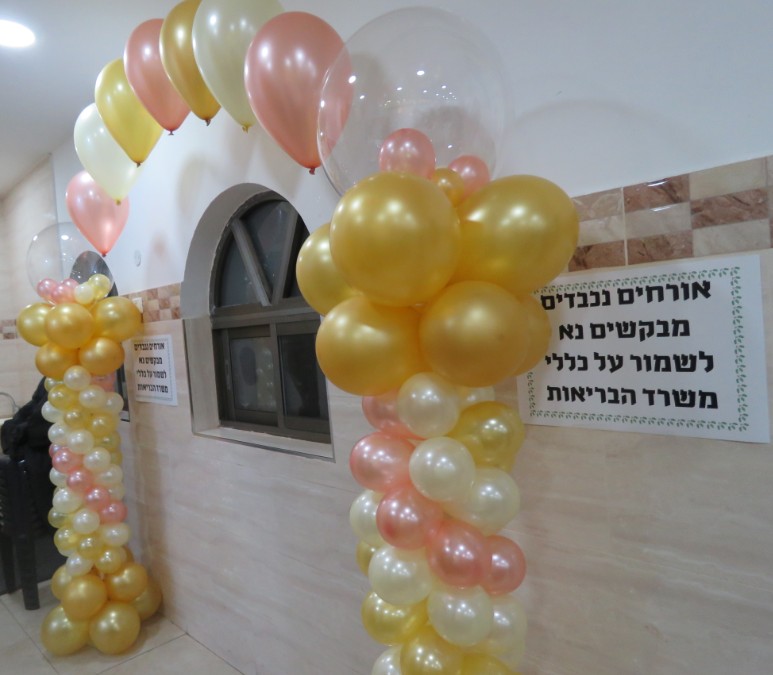 Balloon design in the synagogue. Note the reminder signs hanging
Balloon design in the synagogue. Note the reminder signs hanging"We Decided to Move Up the Wedding"
"We saw great siata dishmaya (divine intervention) at every moment," says Hedva Eisen from Beitar. Hedva married off her daughter during the height of the "corona days." "My daughter's wedding was supposed to be on Wednesday, the 22nd of Adar," she recounts. "It's amusing to now see her friends' calendar — a calendar highlighting the days from engagement to the desired wedding day, each with a chocolate candy attached. With each passing day, she took down another candy, like a game symbolizing sweet anticipation. Baruch Hashem, my daughter is now happily married, and chocolates are still hanging on the calendar, waiting for the festive detachment... Her wedding just moved up."
Why did you decide to move up the wedding? What led to this decision?
"Everything happened very quickly. Right after Purim, new instructions began appearing one after another, and we understood that with the pace of restrictions — it was advisable not to delay: on the night after Purim, there was talk of limiting wedding participants to a hundred people. We didn't know what to do. We checked with the hall owners how they intended to handle the limitation, and they said they would build a drywall to split the hall into two parts, we would invite fewer guests, and manage. But on Motzei Shabbat, we heard that from then on, you could only gather up to ten people and even the wedding halls were closing."
How did you react upon hearing such disappointing news?
"No doubt. It was difficult news that could have led to great disappointment for all of us, but no. I knew that when a person faces a trial, standing on the edge, there are two options: if he takes a step towards Hashem, Hashem will help and strengthen him more and more, and if G-d forbid, he sinks and loses faith — he might deteriorate and fall further, and then it's much harder to rise again. The yetzer (evil inclination) lurks at this moment, trying to catch us in a web of disappointment and anger. Therefore, the first thing we did was to turn on the tape recorder at high volume to dance together with all the children in lively dances. Yes, we are happy no matter where the wedding will be. Baruch Hashem, there is a bride, there is joy, and there will be a wedding with Hashem's help. True, we don't know how, what, and who, but we believe in Hashem and are happy. It wasn't easy for any of us, certainly not for the bride, but with the faith-filled dancing, joy also rose. The bride joined the dances, and eventually danced even more than we did."
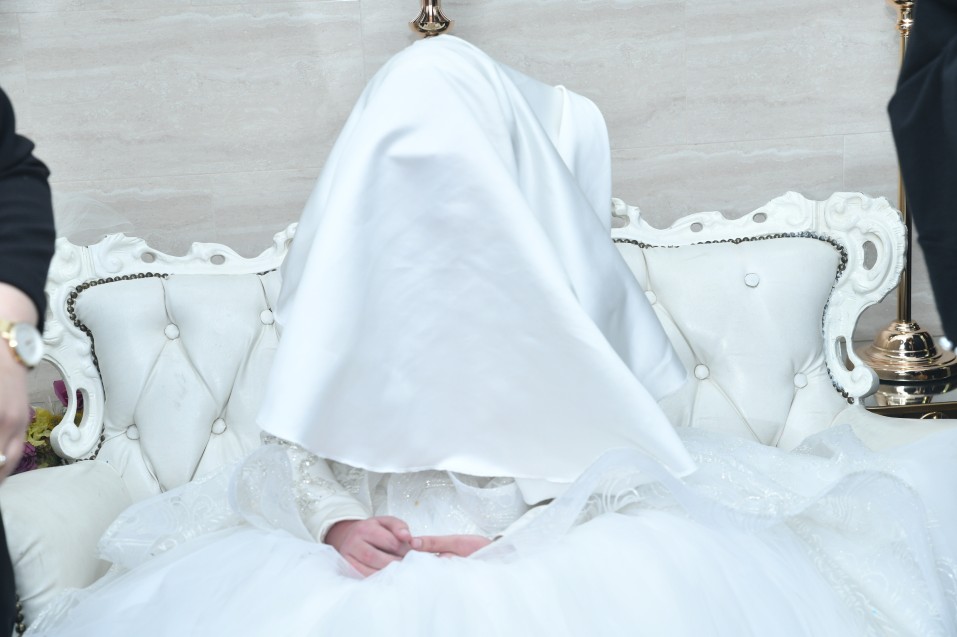 The bride before her ceremony
The bride before her ceremonyDid the bride dance too? And was she genuinely happy? It's hard to believe. A dream wedding vanished, a once-in-a-lifetime event celebrated without the enthusiastic plans, and the bride dances? It seems almost like self-denial...
"We didn't lie to ourselves," Hedva explains simply. "We only strengthened our faith, clinging to Him precisely in those first moments of crisis. Later, with His heavenly assistance from above — everything looked better. Late at night, after the dancing calmed down and my daughter went to sleep, I asked to talk with her. I said to her honestly: 'I don’t know what kind of wedding you will have, and what the setting will be. But know that a Jewish wedding is the holiest and grandest thing for the Jewish nation. Hashem will still bestow upon us an abundance of joy and holiness beyond description. Yes, I promise you this will be the happiest wedding in the world!' I knew and felt that even amidst our great uncertainty, Hashem was with us. He did everything for our good, and He will not leave us even in these moments."
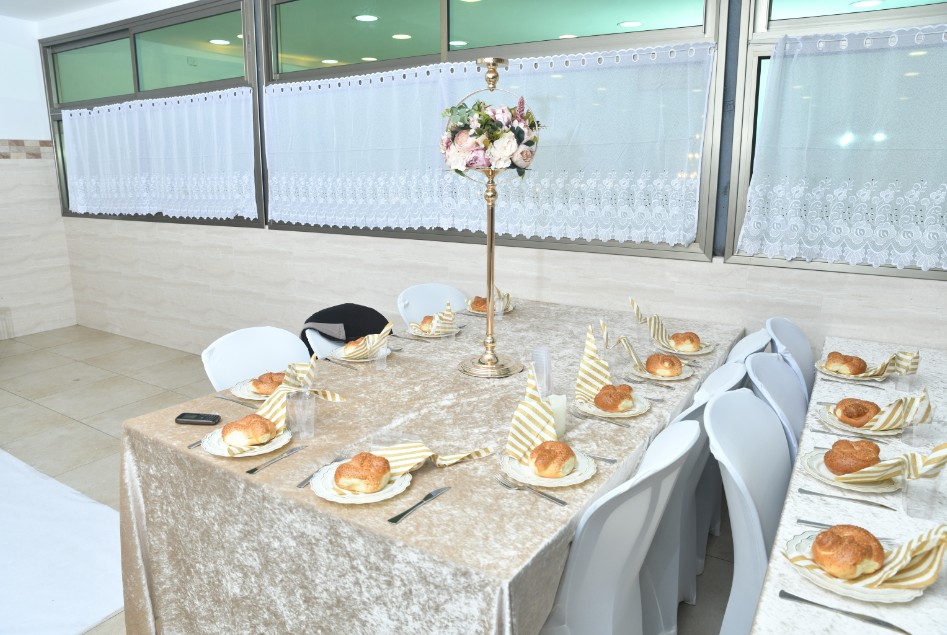 Tables set for the mitzvah feast
Tables set for the mitzvah feast"By the way, my eldest daughter, already married, wasn't with us on Motzei Shabbat, and when she heard the new guidelines, she came in the morning crying and shocked. I gently stopped her at the entrance and said, 'Sit on the bench outside and relax. There is a bride in the house. Tears and sorrow cannot enter here. No way. Only joy. Please, when you are calm, come to us with a smile. Hashem chose to make all these changes and restrictions, and we need to trust Him and be happy.' And she did, what else? The bride must be joyful."
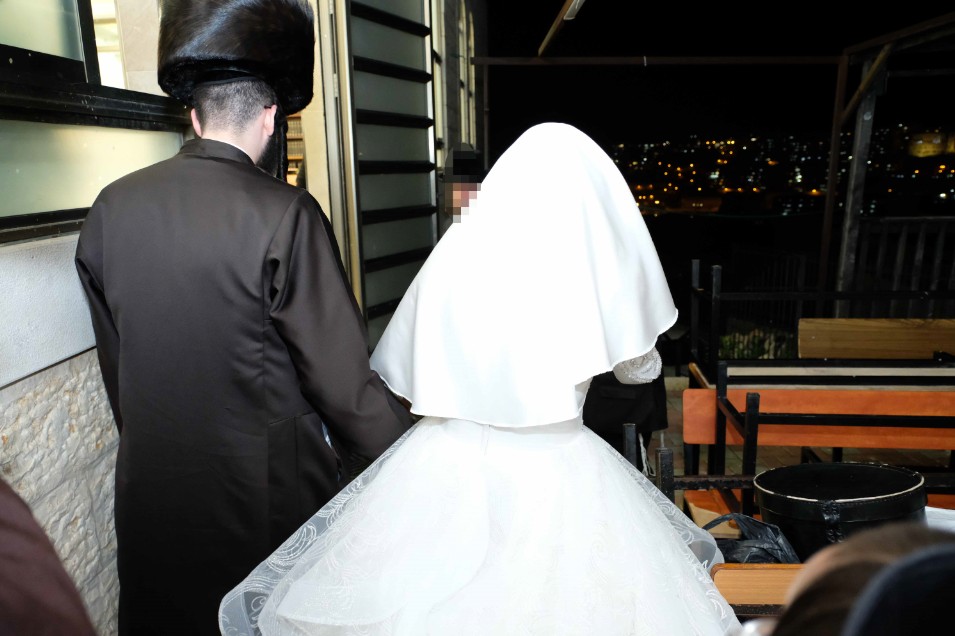 Right after the ceremony, in the synagogue courtyard
Right after the ceremony, in the synagogue courtyardBut how do you deal with the restriction of ten participants?
"This was precisely the burning question: we opened heated discussions about where and how to hold the wedding. Ideas and proposals came and went, but hour by hour it seemed the situation only worsened. Who knows what will happen by the wedding day? We didn’t know what to do. Well-meaning people called to offer their homes, their yards, or their gardens for the celebration, and there was even the idea of holding the wedding in a synagogue near the house we rented for the young couple. The men would be in the synagogue, the women in the women's section, and the yichud room would be in the bride and groom's house. This proposal appealed to us more than the others. Yet, there were still dozens of question marks: who would come and who wouldn't, what to cancel and how, what would happen by Wednesday, and what should be done."
"There were those who recommended delaying the wedding entirely until the restrictive guidelines were lifted, but we knew that our primary obligation as parents was to care for our children's spirits. We realized that postponing the wedding at the last minute would cause immense sorrow for the bride and groom, and we couldn't allow that. Although we wanted a normal wedding in a regular, beautiful hall with many guests, their sorrow took precedence over all the plans. On that Sunday, around three in the afternoon, we reached a decision: today. Tonight. The wedding. What a relief that was. After the lengthy torment of endless deliberations and discussions, there was finally a resolution. There is no joy like dispelling doubt."
 The bride's chair in the synagogue
The bride's chair in the synagogueAnd alongside the joy - it's still a particularly surprising decision. A wedding from today to today seems entirely impractical. How did you manage to organize it?
"From the moment we decided to hold a wedding in the evening, everything began to move. The Jewish community rallied in its full glory to arrange the wedding. We have dear neighbors who helped in an unbelievable manner: they quickly made a task list, and each family member took on one task, and the neighbors took responsibility for the rest: calling the dressmaker for the bride's gown, the makeup artist, the wig stylist, the designer, the caterer, the orchestra... checking who could come early and who needed to be sourced anew. One neighbor brought flowers from Jerusalem, another borrowed a white armchair for the bride, someone made a beautiful arch from balloons, and another brought beautiful tablecloths and utensils from a g'mach. Someone else asked a disposable-ware store to open especially and ran to buy tableware for the meal."
"In between, I remembered that we also needed to decorate the building, and I asked the neighbors not to skip and do it as they prepare for every bride departing from the building. We have a bride for all intents and purposes, and she must leave tonight from a building decorated with flowers and balloons. Like the balloons, I also asked not to skip hairstyles for the daughters — the bride's sisters. During the initial hasty preparations, there was a slightly bitter feeling in our hearts of 'a synagogue wedding? Well, we don't need anything anymore. It will be a lousy wedding anyway...' but I told my daughters: 'We are going to celebrate at this wedding. We must do everything we can to make it a happy wedding.'"
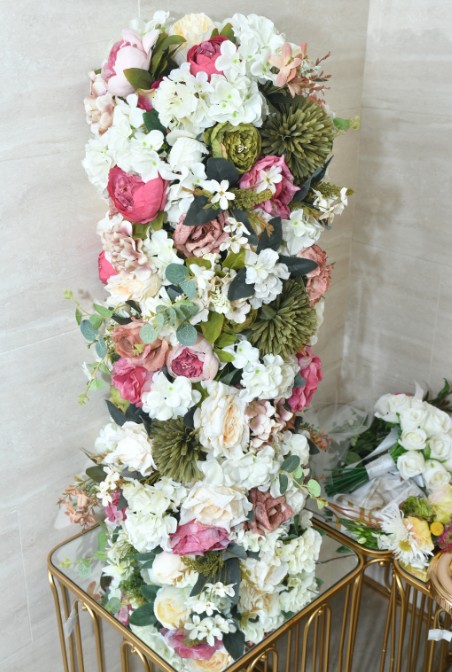 Flower design in the synagogue that turned into a banquet hall
Flower design in the synagogue that turned into a banquet hall"The Bride Was Joyful"
Hedva's voice is full of strength, but I wish to clarify one troubling point: within the whirlwind of swift preparations, did your bride have the time for emotional and mental preparation for the event? Did she have a quiet corner to contemplate the most important event of her life?
"Yes, it was very important to me," she confirms. "Alongside all the running and preparations, we maintained a private and quiet space for the bride, like an island of peace and calm within a sea of tasks. She sat and prayed, detaching from all the commotion. I told her, my daughter: 'Know that you are now on such a high level, like the righteous of the generation. You are going through a trial that many righteous people have not experienced, and precisely now you can achieve great blessings for all of us and all of Israel. Pray for us, for your father and mother, for the children, and for all of Israel.'"
In just a few hours, the Eisen family organized their daughter's wedding. "In the end, we lacked nothing," recounts Hedva, "we even had a large challah, as is our custom, for the groom to break. Interestingly, when the neighbors came to set up the tables in the synagogue, they realized they had forgotten to arrange for a challah. One waiter heard this and firmly said: 'There's no such thing. Bring me oil, flour, and sugar, and I will prepare the challah immediately.' And so it was. About two hours later, the challah arrived at the hall, and we didn't even know what had happened behind the scenes. Many helpers worked hard and diligently for the wedding, and I don't even know who and what everyone did. May the good name bless each helper."
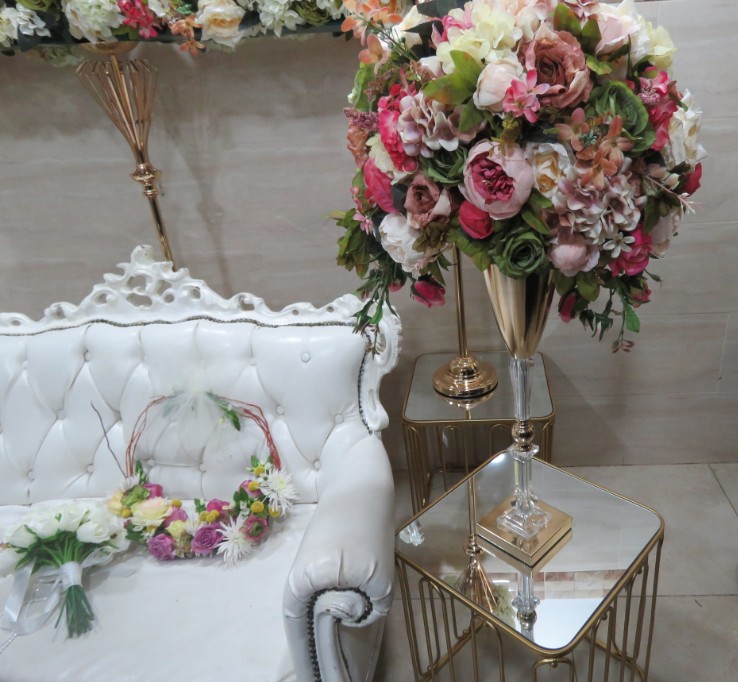 Even a bouquet of flowers arrived for the bride on time...
Even a bouquet of flowers arrived for the bride on time...And when everyone participates in the preparations and efforts, the joy is also shared and unified. "It was a wedding of the entire Jewish people." Hedva enthusiastically describes. "Everyone participated, and everyone danced with special joy and a sincere intention to make the bride and groom happy. Some from afar and some from close. The dances took place in small groups, maintaining distance and space, and with great caution, but with immense joy. Outside the synagogue, we set out refreshments, and guests stood on the street at a distance from each other, no more than ten people, and they took turns during the evening. At the entrance to the synagogue and in the stairwell, the neighbors hung large reminder signs not to gather more than ten people, and we were very careful to adhere to safety guidelines. Baruch Hashem, the general restrictions did not reduce the level of joy. On the contrary, the atmosphere was elevated and uplifting. We felt that it was not a wedding full of externalities and material splendor. Everyone invested only in the internal and came with pure intent to make the bride and groom happy. This was a particularly holy and joyful wedding.
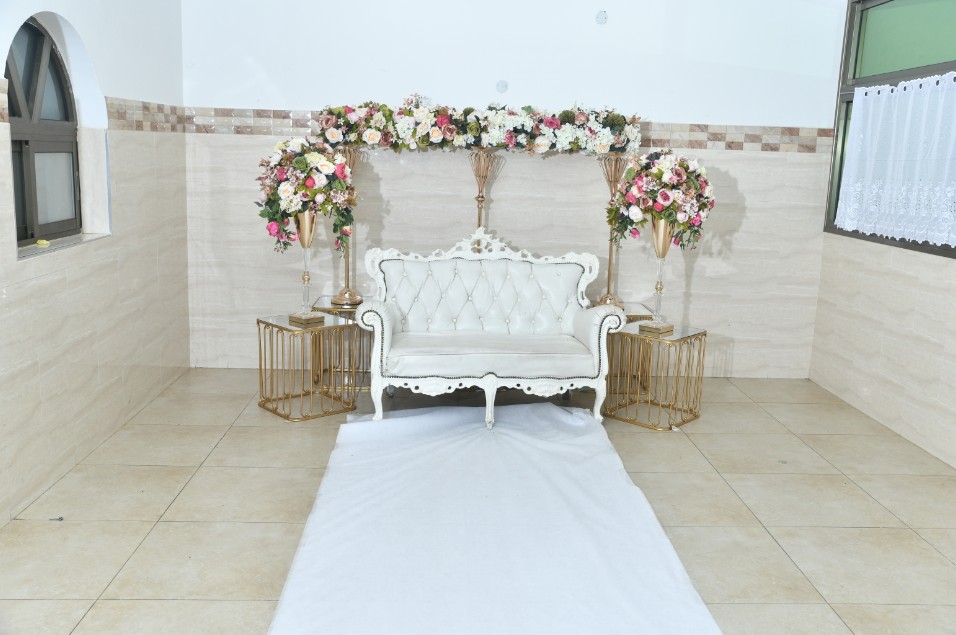 A white path and a bride's chair in the 'hall' in the synagogue
A white path and a bride's chair in the 'hall' in the synagogue"Also we, as parents, merited to focus on this great mitzvah, of marrying off a child in Israel, and felt a great closeness to Hashem and an astonishing sweetness. May I merit to preserve and maintain these lofty feelings all my life. And not just me and my husband, all the children felt true Jewish elevation and joy."
And how do you feel now, after the celebrations have ended and the young couple begins their lives and enters routine? Is there any feeling of missing out on the event that was not as planned?
"Certainly not. Even now, after the trial, and after the wedding is behind us, we are all happy. The children don’t stop talking about how joyous the wedding was, how much holiness and elevation were felt in it. It is a special experience etched in all our hearts with much joy and excitement. Not at all as a trauma, and this is Hashem's grace. The main thing is that the groom and the bride are happy. They are happy together, and the smile on their faces tells me what great siata dishmaya (divine assistance) was with us until now, and with Hashem’s help, will continue. And one last sentence to end - I think that especially in these difficult days, the Jewish people helped and supported each other so much in organizing weddings despite everything — and certainly brought the redemption closer."

